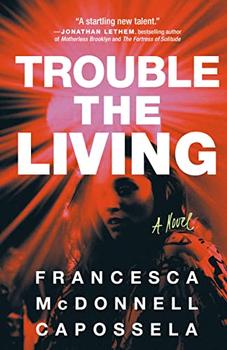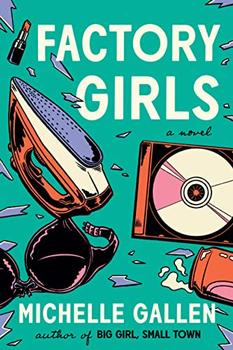Summary | Excerpt | Reading Guide | Discuss | Reviews | Beyond the book | Read-Alikes | Genres & Themes | Author Bio

A Novel
by Francesca McDonnell CaposselaFrancesca McDonnell Capossela's wonderful debut, Trouble the Living, opens in Northern Ireland during the late 1990s—the waning days of "the Troubles." Eighteen-year-old Brid has a complex family life; her mother is an IRA supporter, while her father is a violent drunk. Each of them feels trapped in their marriage, and Brid and her siblings constantly navigate the hazards of their parents' volatile relationship. It's clear that Brid's mother sees her daughter as a younger version of herself, attempting to groom her into a future IRA partisan—a role Brid at first relishes but later comes to regret.
Fast-forward eighteen years, and Brid is now a mother herself, living in California with her fifteen-year-old daughter, Bernie. As the plotline shifts to Bernie's story, readers will identify parallels between the complicated dynamics in both timelines; Bernie's teenage crises echo in many ways those encountered by her mother at the same age.
The narrative voice alternates between the younger Brid's and Bernie's first-person perspectives. As Brid's timeline converges with Bernie's, each is forced to reckon with her identity and understand the role their mothers have played, for better or worse, in shaping the people they've grown to be.
Capossela's writing is beautifully descriptive throughout, every paragraph bringing to life her characters' observations and emotions:
"Coalisland was closed as a fist to the outside—suspicious of strangers, gossipy about anyone who looked or dressed or spoke differently from us—and while to me that felt like protection, I could imagine it feeling like a prison, too. Maybe that was why [my sister] was always looking over the horizon line, studying the backdrop of the music videos we watched on MTV, looking for palm trees and white beaches and skyscrapers. For cacti and exotic birds."
Capossela is also adept at capturing teen angst. Each of her heroines is on the cusp of adulthood in her timeline—an age at which many struggle to define themselves. Her visceral, spot-on portrayals of their confusion, anger and search for identity will likely evoke readers' memories of their own teenage years.
The narrative touches on many themes: mother/daughter relationships, domestic and political violence, sexuality and dysfunctional families, to name just a few. A book that covers this much ground might feel overstuffed, but in this case Capossela weaves together these thematic threads so seamlessly that only after the conclusion does one truly recognize and appreciate the novel's density.
The book's highlight, though, may be the author's skill with character development. At first Brid and Bernie seem swept away by people and events—passive players trying to live up to others' ideals. In the end, though, each is empowered to decide her own destiny; they assert themselves and choose the path they feel is best, no longer controlled by their mothers' expectations. It's a powerful image of the inner strength we all are capable of possessing, and one that will likely resonate deeply with many readers.
Trouble the Living is an impressive debut that will likely draw a wide audience but will probably appeal primarily to female readers. Its many weighty themes would also make this a great selection for a variety of book groups. The novel's exploration of mother-daughter relationships as well as the challenges of becoming an adult will ring true for most, and its fast-paced storylines will keep readers riveted.
![]() This review
first ran in the November 15, 2023
issue of BookBrowse Recommends.
This review
first ran in the November 15, 2023
issue of BookBrowse Recommends.

If you liked Trouble the Living, try these:

The End of the World Is a Cul de Sac
by Louise Kennedy
Published 2024
Brilliant, dark stories of women's lives by "a very major talent" (Joseph O'Connor, Irish Times)

by Michelle Gallen
Published 2022
A funny, fierce, and unforgettable read about a young woman working a summer job in a shirt factory in Northern Ireland, while tensions rise both inside and outside the factory walls.
Your guide toexceptional books
BookBrowse seeks out and recommends the best in contemporary fiction and nonfiction—books that not only engage and entertain but also deepen our understanding of ourselves and the world around us.